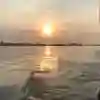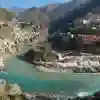RAMESES
The Resilience and Sustainability of the Mekong Delta to Changes in Water and Sediment Fluxes

Project summary
The Challenge
The world's 33 largest deltas are being drowned by relative sea level rise, placing many large cities, key infrastructure and over 0.5 billion people at risk globally.
The Approach
Rameses investigates the Mekong Delta in Vietnam with UK and International partners, as an example of how large deltas evolve under compound human pressures.
The Outcome
Rameses enhances knowledge of delta processes to aid effective management of the risks posed by relative sea level rise and flooding.
Institutes and centres
Lead academics
The Challenge
The world's 33 largest deltas are being drowned by relative sea level rise and are, as a result, rapidly losing land. This process is also driving an exacerbation of flood risk in these environments, which is placing many large cities, key infrastructure and over 0.5 billion people at risk globally.
These issues are most acute for deltas across Southern and Southeast Asia, where an estimated 20% of land will be lost by 2100. These risks are significant. For example, floods during the 2011 Asian monsoon killed an estimated 2000 people and caused ~US$45 billion in economic damage across SE Asia.
Large river deltas, and their ecosystem services, underpin regional food security for rapidly growing populations. However, due to the relative sea-level rise, they are experiencing an accelerating saline intrusion that threatens the availability of clean drinking water, agricultural productivity and food security in general.
There is therefore an urgent need to evolve an improved generic understanding of the processes behind the relative sea level rise and flood risk dynamics in these deltaic environments into the future.
The Approach
Rameses investigates the Mekong Delta in Vietnam as an example of how large deltas evolve under compound human pressures. This area of fertile, low-lying land is home to 18 million people and supports the livelihoods of at least 60 million. The area is slowly drowning as global sea-levels are rising, sediment reserves are being depleted and extreme river floods worsen.
Led by the University of Hull, the research team are working in collaboration with key stakeholders in the region representing both government agencies (Southern Institute of Water Resources Research - SIWRR) and academic institutes (Can Tho University). This partnership working is key to the success of the project.
The project investigates flow and sediment routing through the Delta across the annual monsoon flood to develop a new generic understanding of the impact of relative sea-level rise and sediment routing processes through distributary channels and key bifurcation sites on the delta. This is achieved through collection of new state-of-the-art field datasets, development and application of a suite of morphodynamic numerical models and utilisation of system dynamics modelling to guide adaptations to changes. Historical data provided by the project's Vietnamese partners has developed our understanding of deltaic evolution through the recent past.
The research team
Dr Grigorios Vasilopoulos
Lecturer in Geospatial and Earth Observation, University of Hull
Professor Daniel Parsons
Former Director, Energy and Environment Institute
The Impact
Our strategy is to deliver results with key stakeholders in the region who are best positioned to effectively influence decision making and policy and involves approaches across two timescales - a near-time engagement to inform in 'real-time' floods (i.e. during the course of the proposed work) and activity which will focus on legacy beyond the project.
Flood and deltaic evolution models are critical in effectively managing the risks posed by relative sea level rise and extreme flood variability. Our work aims to provide a much enhanced generic knowledge of delta processes and we expect our results to be applied in the management of deltas within many areas worldwide.

Rameses in the news
In October 2018, the BBC’s Science Editor David Shukman spent some time on board a research vessel on the Mekong with the Rameses research team. The research was featured on BBC One’s national news.
The British Ambassador in Vietnam, Gareth Ward, also shared a video via X, summarising the project and showing footage from a day on the survey vessels with the research crew.








